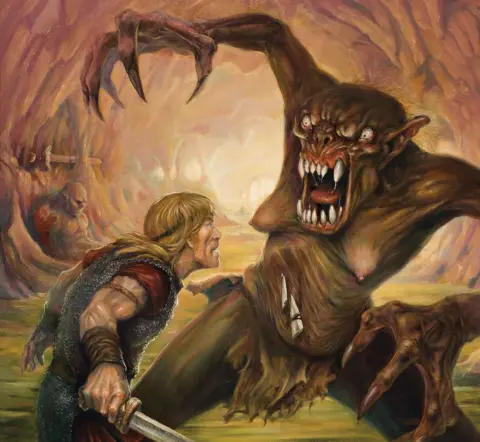
Beowulf is fighting with Grendel’s mother when she seeks vengeance.
Few works of literature have endured as long or resonated as deeply as Beowulf, the towering masterpiece of Old English poetry. Composed between the 8th and 11th centuries, this epic tale of heroism, mortality, and legacy continues to captivate modern readers. But what makes Beowulf so timeless? Let’s journey into its mead halls, monster-filled swamps, and dragon-haunted barrows to uncover the heart of this ancient saga.
The Original Voice of Beowulf
Before diving into the story, here’s a glimpse of the poem’s original Old English, followed by a modern translation:
“Hwæt! Wē Gār-Dena in geār-dagum,
þēod-cyninga þrym gefrūnon,
hū ðā æþelingas ellen fremedon.”“Listen! We of the Spear-Danes in days of yore,
of those clan-kings heard of their glory,
how those nobles performed courageous deeds.”
These opening lines—booming with grandeur—immediately pull us into a world of legendary kings and heroic exploits. The poem’s alliterative verse and rhythmic pulse make it unforgettable, even in translation.
The Plot: A Hero’s Three Battles
Beowulf is divided into two parts, each marking a pivotal phase in the hero’s life:
- Youthful Glory: Grendel and His Mother
- The poem opens in Denmark, where King Hrothgar’s great mead hall, Heorot, is terrorized by Grendel, a monstrous descendant of Cain.
- Beowulf, a young Geatish warrior, arrives and defeats Grendel bare-handed, tearing off the creature’s arm in a visceral clash: “Þā hē gefēng hraðe forman sīðe
slǣpendne rinc, slāt unwearnum,
bāt bān-locan.” “Then he [Grendel] quickly seized the first warrior,
slew him sleeping, tore him apart,
bit through bone-locks.” - When Grendel’s mother seeks vengeance, Beowulf dives into her underwater lair and slays her with a magical sword.
- Aging Majesty: The Dragon’s Wrath
- Fifty years later, Beowulf is now a wise but aging king. When a dragon awakens to punish a thief who stole its treasure, Beowulf faces his final battle.
- Though he kills the beast, he is mortally wounded—a moment captured with somber beauty: “Him þā gegiredan Gēata lēode
ād on eorðan unwāclīcne.” “Then the Geatish people prepared for him
a funeral pyre on the earth, no small one.” The contrast between Beowulf’s youthful vigor and his tragic end underscores the poem’s meditation on time and legacy.
Themes That Still Speak to Us
1. Heroism vs. Hubris
Beowulf’s strength is undeniable, but his pride blurs the line between courage and recklessness. His refusal to use weapons against Grendel showcases his valor—yet his final battle reveals the cost of overconfidence.
2. Fate and Mortality (Wyrd)
The Anglo-Saxon concept of wyrd (fate) looms large. Despite his triumphs, Beowulf cannot escape death, reminding us that even legends are mortal.
3. Christian Allegory or Pagan Saga?
Scholars debate whether Beowulf is a Christian allegory (with Beowulf as a Christ-like figure) or a pagan heroic myth. The poem’s layered worldview—where monsters symbolize sin and kingship demands sacrifice—makes it endlessly interpretable.
Why Beowulf Still Matters
Beyond its historical significance, Beowulf feels profoundly human. Its hero isn’t invincible; he ages, doubts, and dies. His people mourn not just a king but a protector whose passing leaves them vulnerable—a poignant reflection on leadership and loss.
Modern adaptations, from Seamus Heaney’s translation to Neil Gaiman’s screenplay for the 2007 film, prove its enduring appeal. Even John Gardner’s Grendel (1971) retells the story from the monster’s perspective, adding depth to this ancient narrative.
Difficult Words & Meanings
- Mead-hall: A communal gathering place for feasting (e.g., Heorot).
- Thane: A warrior or loyal retainer.
- Wyrd: Old English for “fate” or “destiny.”
- Kenning: A poetic metaphor (e.g., “whale-road” for the sea).
- Scop: An Anglo-Saxon bard or storyteller.
Beowulf is more than a monster-slaying epic—it’s a mirror held to our own struggles with bravery, time, and the marks we leave behind. As Tolkien noted, its elegiac tone lingers like smoke in a darkened hall, whispering of glory and dust.
Have you read Beowulf? What moved you most—the battles, the poetry, or its haunting ending? Share your thoughts below!

No Responses